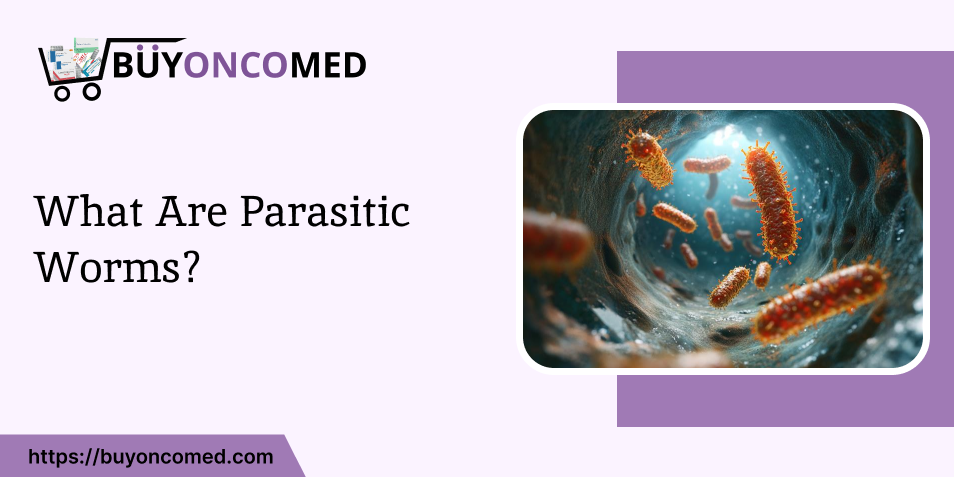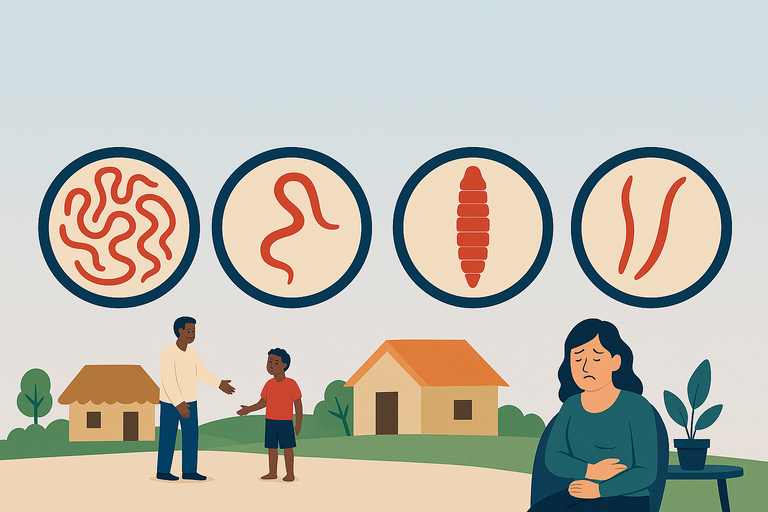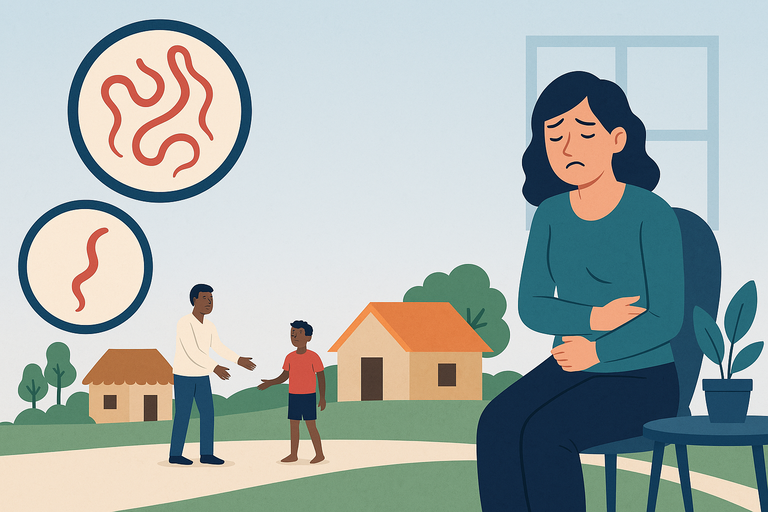
Introduction To Parasitic Worms (Helminths)
Parasitic worms, also called helminths, are tiny organisms that live in or on people and animals. They use their host’s body to survive, grow, and make more worms. Some are so small you can’t see them without a microscope, while others can be several feet long. These worms are more common than most people think. Around the world, millions of people have a parasitic worm infection at some point in their lives, especially in places with warm weather and poor sanitation.
Service area note: In the United States, cases are more common in the South and areas with warm, moist climates, but anyone can get a parasitic worm infection.
Types Of Parasitic Worms

Roundworms (Nematodes)
Roundworms are the most common group of parasitic worms.
- Examples: Ascaris (large roundworm), hookworm, pinworm, whipworm, threadworm.
- They look like spaghetti and can live in your gut.
- Most roundworms spread through soil, dirty hands, or contaminated food.
Flatworms (Platyhelminths)
Flatworms have flat, leaf-like, or ribbon-shaped bodies.
- Two main groups:
- Flukes: Like liver fluke or blood fluke (schistosomiasis)
- Tapeworms: Like beef tapeworm, pork tapeworm, fish tapeworm
- Flukes: Like liver fluke or blood fluke (schistosomiasis)
- Some can grow very long in your intestines or organs.
Thorny‑Headed Worms And Others
These are less common but can infect humans, too. Thorny-headed worms attach to the walls of the gut.
How Parasitic Worms Infect People
Life Cycles And Transmission
Parasitic worms have special life cycles:
- Eggs: Released into the environment through stool.
- Larvae: Sometimes pass through soil, water, or animals before reaching a person.
- Adults: Live in the gut, blood, or organs.
How You Get Infected:
- Swallowing worm eggs in food or water
- Touching dirty surfaces and then your mouth
- Walking barefoot on contaminated soil
- Eating undercooked meat or fish
Risk Factors And Where Worms Are Common
You’re more likely to get a worm infection if you:
- Live in or travel to warm, humid areas
- Don’t have access to clean toilets or safe drinking water
- Go barefoot outside
- Work with animals or soil
- Children are at higher risk due to hand-to-mouth habits
Symptoms Of Parasitic Worm Infections
Common Symptoms
Many people don’t feel sick at first. Some notice:
- Stomach pain or cramps
- Diarrhea or constipation
- Itchy bottom (especially at night with pinworms)
- Weight loss or no appetite
- Tiredness, weakness
Specific Problems From Different Worms
Some worms cause special problems:
- Ascariasis: Blocked intestines or cough
- Hookworm: Blood loss and anemia
- Tapeworms: May cause cysts in organs (rare, but serious)
- Schistosomiasis (blood fluke): Liver and bladder problems
- Pinworm: Severe itching around the anus, especially at night
Diagnosing Parasitic Worm Infections
Doctors use a few different tests to find out if you have worms:
- Stool sample: Checks for worm eggs under a microscope
- Tape test: Special sticky tape to catch pinworm eggs around the anus (mostly for kids)
- Blood tests: Look for higher eosinophil counts (a type of white blood cell)
- Imaging: For rare cases, scans may show larger worms or cysts
Treatment And Prevention
Deworming Medications
Most worm infections are easy to treat:
- Common medicines: Albendazole, mebendazole, ivermectin, praziquantel
- One or two doses usually work, but sometimes a repeat dose is needed
- Some medicines can be bought over the counter, but it’s best to talk to a doctor first
Hygiene And Sanitation Tips
You can stop worms from spreading by:
- Washing hands with soap, especially after using the toilet and before eating
- Wearing shoes outside
- Drinking safe, clean water
- Cooking meat and fish until fully done
- Cleaning bathrooms regularly
How Parasitic Worms Affect Communities

Parasitic worms are a big problem in some parts of the world.
- In some regions of Africa, Asia, and South America, up to 1 in 4 people may have a parasitic worm infection.
- Many schools in these areas run deworming programs for children.
- In the United States, southern states see more cases, especially in rural and lower-income areas.
Location-specific note: If you live in [Your City/Area], check with your local health department about worm prevention and treatment programs.
New Research And Surprising Facts
- Scientists are learning more about how some worms interact with our immune system.
- In rare cases, researchers study worms for possible benefits in treating allergies or autoimmune diseases (this is called the “hygiene hypothesis”).
- But for most people, parasitic worms are a health problem and should be treated.
Frequently Asked Questions (FAQs)
1. What Are The Most Common Parasitic Worms In Humans?
Roundworms, hookworms, whipworms, pinworms, flukes, and tapeworms.
2. How Do I Know If I Have A Worm Infection?
Look for symptoms like stomach pain, diarrhea, itching, or weight loss. Ask your doctor for a stool test if you suspect anything.
3. Can Worm Infections Go Away Without Treatment?
Some mild infections might, but most need medicine. Always talk to a doctor.
4. Is There A Way To Prevent Parasitic Worms Naturally?
The best way is to follow good hygiene, use safe water, and cook meat thoroughly. Avoid “natural” remedies that aren’t proven.
5. Should I Get Tested For Worms If I Feel Healthy?
If you live in an area where worms are common, or if you have traveled to such a place, testing is a good idea.
Takeaway and Next Steps
Parasitic worms can make anyone sick, but simple habits like washing your hands, wearing shoes, and eating well-cooked food can protect you and your family. If you’re worried about worms, see a doctor. Most cases are easy to treat and don’t have to cause lasting problems.
If you have questions about parasitic worms or want to know about deworming programs in your area, contact your local clinic or health department today.

